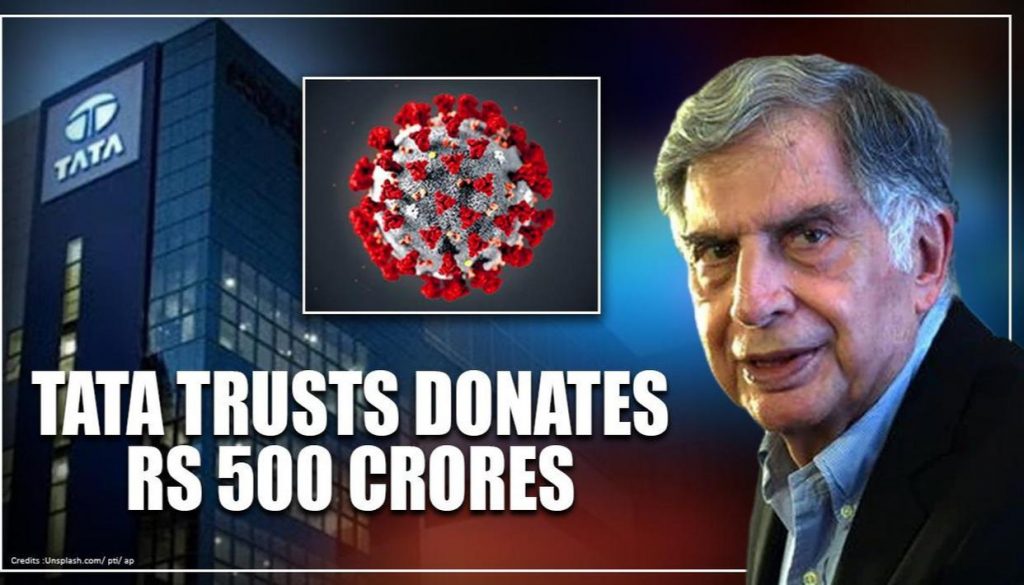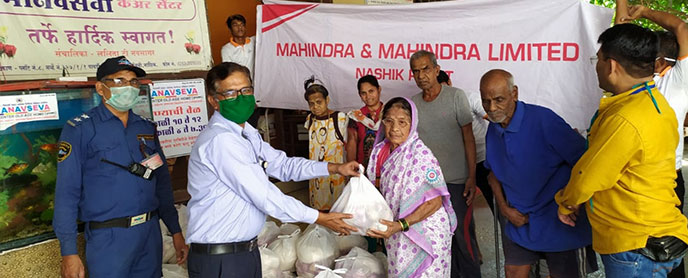
Amid the COVID-19 (coronavirus) outbreak, the Ministry of Corporate Affairs informed India Inc that organization which will donate funds to battle/combat Covid 19 pandemic will be considered valid under CSR activities. Funds may be spent on various activities related to COVID-19 such as promotion of healthcare, distribution of food, payment of medical bills of poor, preventive healthcare and sanitation, and disaster management.
Ratan Tata, Chairman Tata Trusts and Chairman Emeritus Tata Sons, pledged Rs 500 crore to protect and empower all affected communities. The money will be spent on personal protective equipment for medical personnel, respiratory systems for treating increasing cases, testing kits to increase per capita testing, setting up modular treatment facilities for infected patients and knowledge management and training of health workers and the general public.
Ambuja Cements and ACC, both part of Swiss cement major LafargeHolcim group, have collectively contributed ₹3.3 crore to three NGOs to support daily-wagers, migrant labour, slum-dwellers and homeless stranded across the country on account of the lockdown. Ambuja Cement and ACC are support Goonj, an NGO on the forefront of disaster relief with expertise in material management; and Praja Foundation and Mumbai Roti Bank, who are working with labourers and daily wage workers who have lost their livelihood on account of the country-wide lockdown to protect against the coronavirus. Together, these organisations are carrying out multi-pronged containment and relief efforts that require immediate attention across the country.
India is struggling with its worst public health crisis. In times like these, collaborative models are required more and are effective in both containment of the disease and support for those whose livelihood and even survival is at risk. Public health services, politically neglected for decades in most Indian states, have proven their irreplaceable value during this crisis. Although despised by the rich and middle classes, they are shouldering the lion’s share of not just preventive and outreach services but also clinical care. Nearly 80%-90% of critical Covid-19 cases were being treated by public health services. States with robust public health systems like Kerala have been far more successful in containing Covid-19, compared to richer states like Maharashtra and Gujarat, which have under-staffed public health systems. Most corporates gave their contributions to these NGOs who were delivering at grass-root relief measures.
State-run Coal India Ltd said it has contributed ₹221 crore to the Prime Minister’s Citizen Assistance and Relief in Emergency Situations Fund (PM Cares) to fight against the coronavirus pandemic. Employees of CIL voluntarily contributed one day’s salary, which amounted to ₹ 61 crore, and the miner donated an amount of ₹160 crore from its corporate social responsibility corpus to the ‘PM Cares Fund’. Despite several challenges during the crisis period, the subsidiaries of the Maharatna PSU produced coal. The Maharatna PSU has set a 710 million tonne production target in the current fiscal even though there is a concern over demand.
The CSR arm called ‘SBI Foundation’, of State Bank of India (SBI), committed ₹ 30 crore to implement various COVID-19 relief measures across the country. The fund will be utilised for providing food to the needy, for consolidating healthcare infrastructure, capacity building of healthcare workers and research on coronavirus-related projects along with the Indian Institute of Science (IISc). To implement these initiatives, SBI Foundation set up a new flagship programme on health theme which included distribution of ventilators and personal protective equipment to hospitals and supply of 10,000 freshly cooked meals daily at four centres.
The lockdown crippled the economy for more than seven months which sparked exceptional distress; it turned the so-called lower middle class into the new poor class of the society. Teachers in unaided private schools, office assistants, data entry operators, salespersons, receptionists, beauticians, entertainment industry support workers those who run small mobile phone service and repair shops and other service providers who fall in ₹5,000 to ₹15,000 monthly income group were the badly hit. They grappled to survive. While the nation paid attention to the socially poor and the migrant workers who are faced the brunt of lockdown, we hardly paid any attention to lower middle class families with meagre income due to the society’s lopsided priorities.
The lower middle class is always caught in a dilemma as their dignity holds them back from extending their hands to seek aid. The focus of all aid programmes of both the government and NGOs is people who are traditionally perceived poor and who are indeed poor but the lower middle class, who are also in dire need of assistance are left out.

Anand Mahindra, Chairman, Mahindra Group was among the first corporate leaders to come out with clear commitments. He said that his group will begin work to use existing manufacturing facilities to make ventilators to combat Coronavirus. From converting existing manufacturing plants to make ventilators to giving free fuel to emergency vehicles, Mahindra Group announced a slew of initiatives to help combat the crisis over the coronavirus epidemic. Anand Mahindra said he will donate 100% of his salary to create a fund to help small businesses and self-employed people who are expected to be impacted the most due to the outbreak. He also urged our businesses to also set aside contributions for those who are the hardest hit in their ecosystem.
The Godrej Group announced that it is earmarking a fund of Rs 50 crore for community support and relief initiatives in India. This was an initial spending and the corporate said that it hopes to supplement it over time. It has been buying and supplying medical equipment and protective supplies for the Brihanmumbai Municipal Corporation (BMC). As a part of the initiative, the group has donated Rs 5 crore to the BMC, donated 115 hospital beds to Maharashtra government hospitals and helped set up a 75-bed quarantine centre at the Seven Hills Hospital in Mumbai. Moreover, it has supported the free distribution of 1 million packets of Godrej Protekt Mr. Magic powder-to-liquid hand wash in Maharashtra through partnership with the BMC and Thane Municipal Corporation (TMC), partnered with communities linked to their CSR programmes to support 1.12 lakh beneficiaries across 8 states with hand wash, sanitizers and soap, donated sanitizers to the Mumbai police force, begun ramping up capacity to meet the demand for soap, hand wash and sanitizers and initiated outreach through various networks and hand wash education programmes.
As a part of its Corporate Social Responsibility initiatives, Bosch Group in India immediately donated ₹ five crore to PM CARES Fund and pledged additional Rs 45 crore for various community welfare initiatives, the company said in a statement. Bosch India started various welfare initiatives to help the underprivileged. The company supplied cooked meals from its kitchen in Bidadi plant and through the Art of Living Foundation to about 4,000 migrant workers and other needy individuals, on a daily basis.
ICICI Group announced that it is committed ₹ 100 crore to support the nation in its fight against the COVID-19 outbreak. Of this, the Group pledges to contribute ₹ 80 crore to the ‘PM Cares Fund’ and ₹ 20 crore to state governments and local authorities in their efforts to battle the pandemic. The sum of ₹ 100 crore is being contributed by ICICI Bank and all its subsidiaries.
ReNew Power, India’s largest Independent Power Producer in the renewable energy space, ₹ 20 crore to the central and state governments to aid efforts aimed at combating the Covid-19 pandemic. The company’s endeavour was fixed on helping communities impacted by the lockdown and to bolster the health infrastructure to tackle the pandemic. Sumant Sinha, the Managing Director of ReNew in one of his interviews said that his company believes in helping equip the hospitals and their staff with the right medical equipment will strengthen local efforts in tackling this emergency. The company worked across its sites in Gujarat, Rajasthan, Andhra Pradesh, Karnataka, Tamil Nadu, Telangana, Madhya Pradesh and Maharashtra and cover around 140 villages. Additionally, ReNew is adopted a village in Haryana, where around 350 vulnerable households were provided with dry ration and hygiene kits.
In 1963, the free-market philosopher Milton Friedman described corporate social responsibility as “fundamentally subversive”, writing that corporate responsibility is the pursuit to be carried out by individual organizations for understanding the uncontrolled markets. The tough times showed that businesses do not exist in a vacuum but are part of the society and talking to and learning from the people is part and parcel of organizations.













































